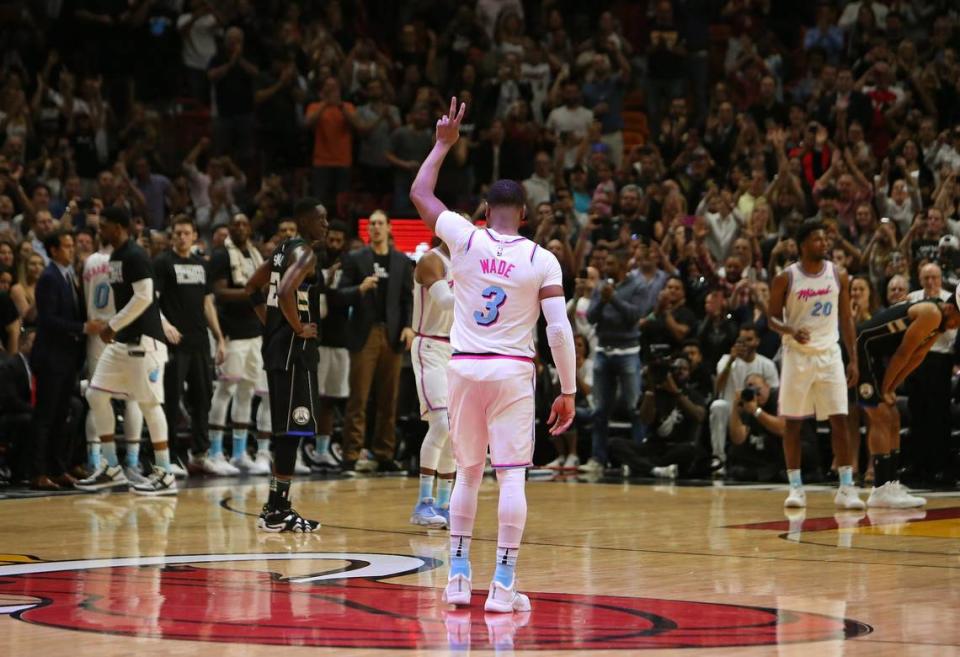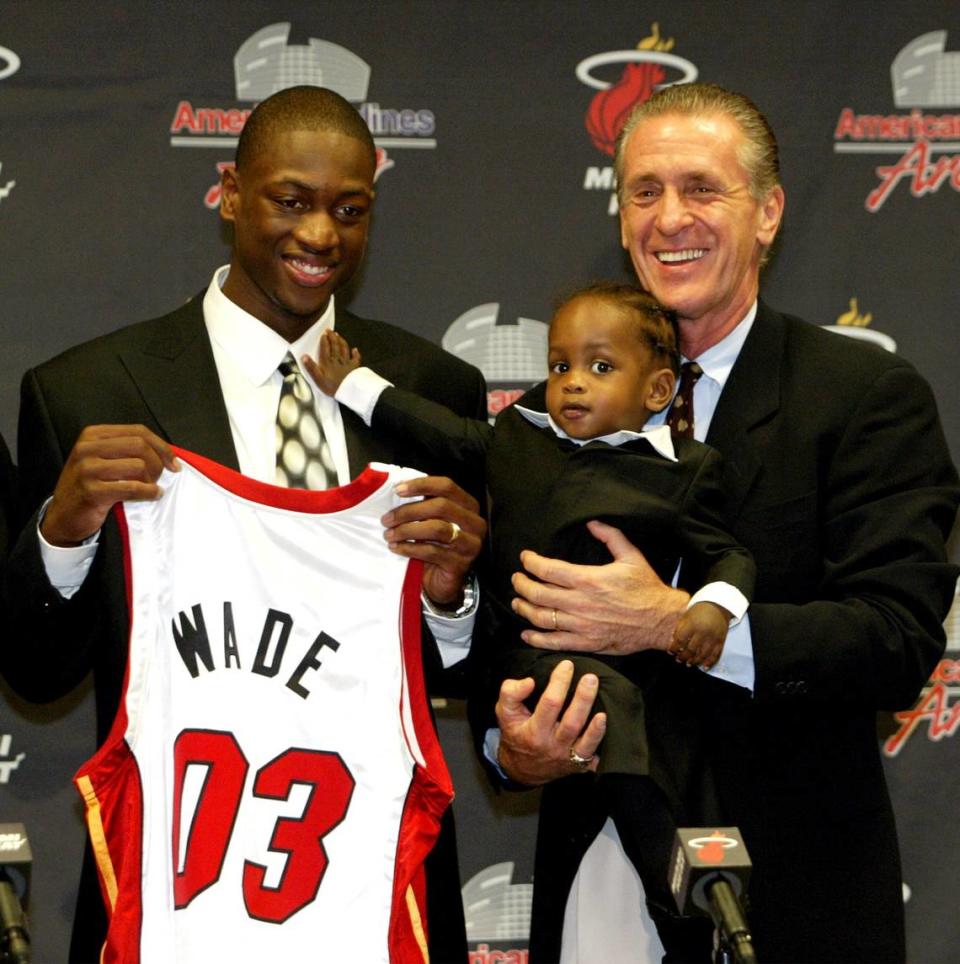Why Heat icon Dwyane Wade enters Hall of Fame as greatest ever in history of Miami sports | Opinion
- Oops!Something went wrong.Please try again later.
- Oops!Something went wrong.Please try again later.
- Oops!Something went wrong.Please try again later.
- Oops!Something went wrong.Please try again later.
- Oops!Something went wrong.Please try again later.
- Oops!Something went wrong.Please try again later.
- Oops!Something went wrong.Please try again later.
We couldn’t know then. You never do. They called the name of the guard from Marquette for the Miami Heat that night of the NBA Draft on June 26, 2003, and what we mostly knew about Dwyane Wade right then was that his first name looked like a birth certificate misspelling ... and that he wasn’t LeBron James.
It was a draft for the ages, the one that would reboot the post-Michael Jordan NBA. LeBron was the most talked-about player since Jordan and a certain top pick. Carmelo Anthony went fast, too, and so did Chris Bosh, taken right before Wade went fifth overall.
“When you’ve been around long enough you get to know when you see a potential franchise player,” Heat president Pat Riley said. “We all knew there were several special players in that draft. You could feel it. And we all wanted them.”
Any team would have done anything to win the LeBron lottery that year, but the Heat could hardly have dreamed what they were getting in Wade. Neither could Heat fans, or South Florida sports fans at large.
Wade lifted a franchise, and a city.
Across 15 seasons and most of two decades — an otherwise barren time in Miami sports — Wade made us feel like winners, made us champions. His No. 3 jersey became chic fashion here. He came to a football town and demanded hoops be in the conversation for what sport we loved most.
Saturday night he takes what he earned: A place in the Naismith Memorial Basketball Hall of Fame in Springfield, Massachusetts. He enters gilded in gold as a first-ballot inductee. He enters as the first player drafted by the Heat to make the Hall. And he enters as simply the best player in Heat history — a list whose nominees of course include LeBron.
“Dwyane is the greatest player who ever put on a uniform for us,” Riley, a qualified judge, said in a conference call with reporters this week. “LeBron was here for four years and gave us a tremendous lift and helped Dwyane achieve what he wanted to achieve. But over the body of work in Miami, Dwyane is the greatest who ever played for the Heat.”
Wade is something else, something more.
He is the greatest of the great. Wade becomes the 34th player to have worn the uniform and played for either the Miami Dolphins, Heat, Marlins or Florida Panthers and gone on to make their sport’s Hall of Fame. Only 11 of those played at least 50 percent of their total career games for their South Florida teams.
Wade’s impact has been the greatest of them all by the measure of career accomplishment, local popularity and national stature. Iconic Dolphins quarterback Dan Marino is close, but a close second.
The difference is both small and enormous: Those three championship parades down Biscayne Boulevard do not happen without Dwyane Wade. The Heat’s reputation for “Culture,” branded in pedigree, started with Wade, too. Well, OK, maybe it started with Riley coming here in 1995 and drafting Wade.
But Wade carried the ball. With artistry and excitement, he did.
Shaquille O’Neal never would have come here to help win the Heat’s first title in 2006 had he not seen Wade as the ascending young superstar to lead the way.
James and Bosh from the upper galaxy of that same ‘03 draft never would have reunited here in 2010 to join Wade in “the Big 3” and win two more championships in 2012 and ‘13 unless Wade had given it his blessing and then made t happen — helping revolutionize the way things are done in the NBA in the process.
Wade brainstorming the Big 3 and then making it as reality ushered in the era of player-empowerment in the sport, of star players maneuvering to get where they want. Damian Lillard trying to get to Miami right now is the latest in that.
Dolphins greats Marino, Bob Griese and Dwight Stephenson played their entire careers for Miami. Otherwise only the Fins’ Zach Thomas — who entered the Pro Football Hal of Fame just last week — played a higher percentage of his career games for Miami (91.30 percent) than did Wade (89.94 percent) among our 34 Hall of Famers overall.
Yet there was turbulence at the end. Like families do, Wade and the Heat went through discord and bitter feelings. It is why he took brief detours to the Chicago Bulls and Cleveland Cavaliers before returning to end his career where he should have in 2019.
Riley admits he regrets not offering Wade a max contract in 2014 to likely keep him in Miami for the rest of his career. With James leaving the Heat that offseason, the Heat opted instead to sign Bosh to a max extension and Wade to a much lesser two-year deal.
Wade would leave amid hurt feelings in 2016.
“I think when he left, it was like a cooling-off period,” Riley said. “It wasn’t something that was borne out of petulance on his part. But when he left, there were some hard feelings on both sides. But they weren’t lethal.”
He has since, in retirement, bought part ownership of the Utah Jazz and WNBA’s Chicago Sky. His childhood hero, Allen Iverson, will introduce him for induction.
Wade also has moved his family from Miami to Los Angeles, but that is unrelated to past ill will with the Heat.
It’s far more personal than that.
Wade and wife Gabrielle Union’s children include a transgender daughter, and Florida’s anti-LGBTQ legislation in the state no longer made the family feel safe or welcome. The family has been hurt to hear slurs aimed at them, but also uplifted to receive encouragement and thanks from parents dealing with the same issues.
“So many lives are being changed because we decided to share [our story],” Wade said on the Dan Le Batard Show this week. “People have sent us flowers, letters. We’re going to keep loving, keep moving through the world and show that love wins.”
Of that rough time with the business of basketball in 2016, “That’s got to be water under the bridge,” Wade said. “My love for Miami and my fan base is forever.”
Wade called heading to Springfield for his Hall induction an “out of body experience,” adding, “I feel excited. I feel numb. It doesn’t happen every day to a kid like myself.”
Like families do, the fighting is past and Wade and the Heat have mended the relation ship.
Riley, coach Erik Spoelstra, assistant Caron Butler, longtime teammate Udonis Haslem, current star Bam Adebayo, owners Micky and Nick Arison and former teammate Alonzo Mourning all are set to be in Springfield helping celebrate Wade.
“Fused at the hip,” Riley calls himself and Wade.
Heat fans may feel the same.
Wade’s first regular-season game for the Heat in 2003 came three days after the Marlins had won the World Series, and there was symbolism in that.
When Wade arrived the winning had ended for the Marlins, the Dolphins and Canes football, and barren times were ahead.
During Wade’s near two-decades epoch in Miami, the Dolphins made the playoffs only three timers and never won in the postseason. The Marlins sank into mediocrity. The Panthers made the playoffs only twice and exited both fast. UM football’s glory days had disappeared. We had no major soccer yet, no dreams of Lionel Messi..
The Heat was Miami’s great hope in sports across much of the past two decades, and that feeling of winning again, that sound of cheering a champion — one man was out front of that, leading it all.
The vast majority of athletes are blips on the screen, drafted and soon forgotten.
The exceptions are ones who stay awhile, who do big things and become part of the collective memory.
Then there are the select few, the generational gifts.
These are the ones who never leave us.


